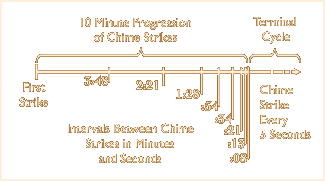 Then I exported the 12-minute sequence to iTunes and burned a disc. If you don't count the CD player and the PowerBook, the total cost of my project was around a dollar.
Then I exported the 12-minute sequence to iTunes and burned a disc. If you don't count the CD player and the PowerBook, the total cost of my project was around a dollar.
Tuesday, November 22, 2005
Homemade Zen Alarm
 Then I exported the 12-minute sequence to iTunes and burned a disc. If you don't count the CD player and the PowerBook, the total cost of my project was around a dollar.
Then I exported the 12-minute sequence to iTunes and burned a disc. If you don't count the CD player and the PowerBook, the total cost of my project was around a dollar.
Wednesday, November 02, 2005
Events Aggregator
Thursday, October 27, 2005
Zach Facts
Diminishing Returns, Local Maxima, & Saying Yes to Life
Tuesday, October 25, 2005
Text-To-Speech Rulez
Monday, October 24, 2005
Divided Attention
Wednesday, October 19, 2005
Strange Facts about Zach
Tuesday, October 18, 2005
This Photo is a Mistake
Wednesday, October 05, 2005
Within Procrastination's Icy Grip
Thursday, September 29, 2005
Pox on Acrobat Reader
- Go to adobe.com and download the download manager (!)
- Go through the download manager installer wizard.
- Download the actual reader through the handy download manager.
- Go through the Acrobat Reader installer wizard.
- Open the Help menu and ask Acrobat Reader to check for updates.
- Authorize some form of Safari repair, whatever that means.
- Download the 7.0.1 update and authorize it to be installed.
- Download the 7.0.2 update and authorize it to be installed.
- Download the 7.0.3 update and authorize it to be installed.
Wednesday, September 28, 2005
The Times They Are A'Changin'
- Java
- Linux
- Oracle
- Cocoa / Objective-C
- Mac OS X
- Ruby
- Ruby On Rails
Thursday, June 02, 2005
The 7 Spheres of Influence
The 7 Spinning Plates of Well-Being
Tuesday, March 01, 2005
Software is an Alien Artifact
Tuesday, February 22, 2005
Yearning to Simplify
Monday, January 17, 2005
The Value of Software
The Great American Lie
Thursday, January 13, 2005
What's it mean to be a badass?
I've been trying to figure out the difference between plain ol' developers and architects. It's supposed to be obvious that architects are better, but I want to put my finger on just how.
So I was listening to Jeffrey Zeldman (http://www.zeldman.com) give his keynote address at the Web Design World conference, and he was talking about Eric Meyer, who is a badass in all things to do with Cascading Stylesheets (CSS). He said, "Eric is the kind of guy you really want on your staff when you don't know how to do something with CSS, because he'll know. And not only will he know how to do it, he'll know seven ways to do it and what's wrong with six of them."
That struck a chord with me. A developer should be able to solve a problem, but an architect can describe a half-dozen approaches to the problem and what's right and what's wrong with each of them. I hasten to add that what's right and/or wrong with an approach will always depend on the context in which the problem is situated. That's why you can't replace a good architect/designer with a shelf full of books, or a small army of interns.
Wednesday, January 12, 2005
the Long Tail
Here is one of those things that sneaks up on you and then just changes the whole damn world. Chris Anderson's article in Wired magazine is the best I've ever seen on the economics of the entertainment industry, including concrete reasons why we're saddled with the likes of Ashlee Simpson.
The "long tail" refers to the shape of the graph of the quantity of success of a thing (a book or a movie or a record etc.) vs. its rank in the popularity pecking order. It looks like this (from Chris's blog): 
That big spike at the front represents the megahits. In music, these are the records at the top of the Billboard chart. The Y axis represents how many copies they sold. The long tail is the area in yellow. This is the obscure stuff. But the significant thing is that there is at least some audience for it. In an age when production costs are plunging, and distribution costs are approaching zero, this means the market for niche products will soon be larger than the market for hits. Not only is this a major disruptive phenomenon for life as we know it, it is wonderful news to these tired ears.
When people ask me what kind of success I want for my band I always tell them, "I want to reach all the people who stand a chance of loving it." The concept of the long tail articulates this beautifully. There are potentially a lot of people buying their records in the "red zone" who would really be into our music. We stand a fighting chance of coaxing them down the curve over to where we are.
